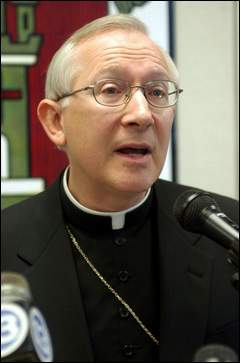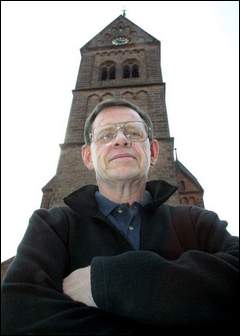Secret Archives at Heart of Dispute; Group Says Files Hold Key
to Abuse
By Robin Erb
Toledo Blade [Toledo OH]
March 6, 2005
On a warm September afternoon, three Toledo detectives and a Lucas County
prosecutor marched through the front door of the Toledo Catholic diocese
and - over the objections of a startled receptionist - loaded into an
elevator and punched the button to the fourth floor.
They were carrying a four-page search-and-seizure order signed by a judge,
and their abrupt appearance at the downtown office of Bishop Leonard Blair
marked a hairpin turn in what had been a cordial relationship between
diocesan officials and criminal authorities investigating the 1980 killing
of an elderly nun.
 |
| Bishop Blair |
"Their communication prior to the search warrants was pretty open
and free-flowing between us," the Rev. Michael Billian, episcopal
vicar and the diocese's top administrator, recalled of the unprecedented
search.
Their target that day: the church's most-secret files - documents that
investigators had hoped might contain clues to a 1980 slaying of Sister
Margaret Ann Pahl and the man charged in her death: the Rev. Gerald Robinson.
Emerging from his office, Bishop Blair told investigators that such papers
simply didn't exist.
But police, who removed 148 documents bearing the murder suspect's name,
weren't convinced. Two days later, they returned with a second court order
to search the office of the second most-powerful man in the 19-county
diocese: Father Billian.
They seized nothing during the second search and haven't returned since.
But the fight may be far from over.
While investigators ramp up their probe in anticipation of the October
trial of Father Robinson, accused of stabbing and strangling the nun in
the Mercy Hospital chapel, a local support group for victims of clerical
sexual abuse has pressed Lucas County Prosecutor Julia Bates to return
with another search warrant.
They want investigators to seize the file that police reviewed during
the second search, but left behind: accusations of abuse by priests. But
so far, Mrs. Bates refuses to say whether her office will return to the
diocese.
The local chapter of the Survivors Network of those Abused by Priests
say the documents may be key to establishing whether the diocese engaged
in a longstanding practice of protecting priests who raped and molested
children under their watch, as alleged in a barrage of lawsuits against
the church since 2002.
While SNAP is asking for the confidential files, diocesan leaders say
such records don't exist. The emerging debate may be new in Toledo, but
it has been playing out for years across the country in a controversy
that has shaken the American Catholic Church.
An ongoing battle
In courtrooms and at mediation tables since the 1980s, civil and criminal
authorities repeatedly have demanded churches' key documents as they try
to prove that a diocese's solution to abusive priests was to quietly move
them from church to church.
By establishing a crucial link between a pattern of cover-up and specific
abuses, attorneys have been able to step around statutes of limitations
to pursue decades-old cases.
In Kentucky, a lawyer used the secret files of a diocese to show that
church leaders knew about a school teacher molesting children but never
bothered to tell police or discipline the abuser.
Despite the fact the abuse took place 17 years earlier - well beyond the
statute of limitations -a jury awarded the victim $750,000, a judgment
that stood on appeal in 1998. By hiding the information, attorneys argued,
the clock on the statute never had a chance to begin running.
"They obstructed the victim from finding out about their liability,
and then they couldn't rely on the statute," said Mary Suzanne Cassidy,
an attorney in the case.
But some church leaders are adamant: Protecting the records is critical
to the church's mission.
In Los Angeles, the archdiocese is locked in a legal battle over the release
of the church's confidential files - not because leaders are trying to
cover up crimes, the church says. It's a matter of principle, said Tod
Tamberg, an archdiocese spokesman.
Such files contain other sensitive information, including issues in local
churches that have nothing to do with abuse. Some priests confide to their
bishops about the most private concerns. Prying open the records can destroy
that communication.
"[Priests] make vows of obedience to him, and the bishop needs to
have confidential communications with those priests. No priest would go
to his bishop on anything if that communication is destroyed," Mr.
Tamberg said.
In Toledo last week, Bishop Blair issued a statement hours after court
documents were released outlining investigators' belief the diocese kept
such a "secret archive."
"There is no indication that one might have existed in the past,
and there is certainly none in the present," he said in a written
statement.
Additionally, Father Billian and diocese spokesman Sally Oberski met with
reporters over the next 24 hours, insisting such records haven't been
kept for years. The failure to keep such an archive goes against Canon
Law, but retaining such files violates the church's new spirit of openness,
they said.
"We have nothing we can't talk about," Ms. Oberski said.
Still, some aren't buying it.
 |
| The Rev. Thomas Doyle, a canon lawyer and longtime priest, says secret church records often lay out a road map of cover-up and conspiracy. Photo by Associated Press. |
The Rev. Thomas Doyle, a canon lawyer and longtime priest who once defended
the church against allegations of abuse, calls the diocese's response
"nonsense."
He said dioceses across the country fight the release of confidential
files - Toledo is no different. The records often lay out a road map of
cover-up and conspiracy that is embarrassing to church leaders, and in
some cases, incriminating, he and others said.
There's a credibility crisis, and church officials can no longer be taken
at their word, even when they insist they're operating under a new policy
of openness, Father Doyle said.
"That's the president of Enron saying we're being transparent. We're
trying to heal, so leave us alone and we'll fix it," he said.
He and others point to a suggestion in 1990 by then-Auxiliary Bishop A.
James Quinn of Cleveland to church leaders: Send sensitive investigative
documents to the Vatican embassy in Washington to avoid subpoenas.
Requirement of secrecy
Canon Law is very specific when it addresses "sub-secreto" -
Latin for "under secret" - archives, said the Rev. Arthur Espelage,
a Jesuit priest and spokesman for the Canon Law Society of America, based
in Washington.
Church law specifically requires all dioceses to keep a separate archive
on matters of criminal and moral allegations. That means investigating
and documenting allegations and preserving the summaries. Only the bishop
or a designee is to have the key.
"It would protect individuals involved by putting the files in a
place that no one would wander in and read it," he said. But at the
same time, that doesn't mean the files should be out of reach of law-enforcement
officials investigating crimes.
Others have wanted the records, including victims, support groups, and
the media.
The Boston Globe in 2002 convinced a judge to lift the confidentiality
seal on such documents, uncovering a long-standing pattern of cover-up
and conspiracy involving dozens of priests.
The newspaper's revelations about the Boston archdiocese and Cardinal
Bernard Law's complicity to conceal the abuse prompted victims to step
forward in more than 100 dioceses.
Victims filed lawsuits, police filed charges, and responses from church
leaders have varied from denial to conciliation:
• In the Archdiocese of Los Angeles, Cardinal Roger M. Mahony is
fighting civil and criminal attorneys and a judge's order to release certain
documents. And in Orange County, a recent settlement with victims mandated
the diocese release records of the alleged abusers. The documents show
a pattern of cover-up, according to victims' attorneys.
• The Archdiocese of Cincinnati repeatedly refused to release its
files, despite pressure from the media and attorneys. Eventually, former
Hamilton County Prosecutor Michael Allen was able to review hundreds of
documents. The contents led to criminal charges.
On Nov. 20, 2003, Archbishop Daniel Pilarczyk, in his priestly collar,
pleaded guilty on behalf of the archdiocese to five misdemeanor counts
of failing to report a felony. The church was fined $10,000.
Dioceses in Manchester, N.H., and Phoenix also have been prosecuted criminally
for similar offenses.
• In Cleveland, the diocese turned over 70,000 documents to Cuyahoga
County Prosecutor Bill Mason, who subpoenaed the materials on all child
sexual abuse allegations. One priest and six lay people were indicted,
Mr. Mason said.
"We went through a grand jury subpoena and they complied," Mr.
Mason said. "I think the bishop [Anthony Pilla] was very forthcoming
with the records. I think we got everything." However, a judge last
year sided with the diocese in keeping the records sealed from the public.
• In April, 2002, the Archdiocese of Detroit and the Wayne County
prosecutor's office announced that they signed a voluntary agreement to
turn over files on sexual misconduct dating back 15 years.
In addition, Detroit Cardinal Adam Maida offered case files to prosecutors
in the other five counties in the archdiocese, including Monroe County.
Maria Miller, an assistant Wayne County prosecutor, said last week that
the archdiocese "has been cooperative and forthcoming with documentation
that we need." Based on the review, prosecutors filed charges against
several priests.
"I think the archdiocese has done an excellent job of self-policing,"
Ms. Miller said.
Steps toward openness
As the crisis from Boston reverberated across the country in 2002, the
Archdiocese of Baltimore took an unusual step: Cardinal William H. Keeler
turned to the Internet to reach out to victims. He posted the names of
every priest accused of sexual misconduct since the 1950s. He also sent
letters to 180,000 Catholic households, apologizing for mistakes he made
in dealing with sexual abuse by the clergy. The move riled some clerics,
who complained some allegations never had been corroborated.
The archbishop, disclosing the local church spent $4.1 million to settle
lawsuits filed by eight victims over 20 years, stood firm. "The truth
is going to come out one way or another," he said, adding that the
Internet posting cleared suspicions and reinforced support for priests
who had never been accused of wrongdoing.
Just weeks before the Baltimore development, the Toledo diocese and the
Lucas County prosecutor's office signed a voluntary agreement modeled
after Detroit.
The accord dictated the diocese open its files involving allegations within
the last seven years, and Father Billian vowed the church would provide
documents going back 50 years or more.
In fact, prosecutors sifted through files but were stymied by Ohio's statute
of limitations. The diocese insists investigators have seen all the files
on abuse and, in the matter of the slain nun, all the records on Father
Robinson. But investigators refuse to talk about what they found in last
year's court-ordered searches.
If the diocese has additional files, prosecutors can expect resistance
in obtaining them, said several lawyers who have sued other dioceses for
such records.
"Oh, they're going to try to fight," said William McMurry, an
attorney who has represented alleged victims in the Diocese of Louisville,
but he added, "Declaring [records] secret doesn't make them secret."
Jeff Anderson, a lawyer who has filed more than 400 sex-abuse cases against
dioceses, including several in Toledo, said that until the local church
releases all its records, "there will be suspicion."
"If the idea is transparency, then you have to be transparent. It's
not just lip service. Other dioceses have released their records, and
they have moved on. There's very little controversy in those places. That's
what Toledo needs to do. Otherwise, there will always be doubts."
Any original material on these pages is copyright © BishopAccountability.org 2004. Reproduce freely with attribution.